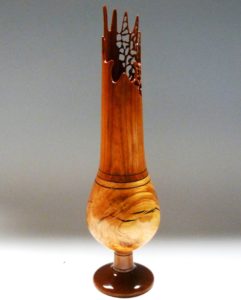history
The archaeological record of woodturning is limited to illustrations because wood is a fiber prone to rot. Egyptian monuments illustrate a strap used by a helper to rotate the lathe while another worker cut the wood. Early bow lathes and strap lathes were developed and used in Egypt and Rome. The Chinese, Persians, and Arabs had their own variations of the bow lathe. Early lathe workers would sometimes use their bare feet to hold cutting tools in place while using their hand to power the lathe. Bow lathes continue in use right up to the present day, and much of our information about them comes from watching turners use them. Between 500 and 1500 A.D., turned wooden vessels served as the everyday bowls and cups of most of the population of Europe. Our knowledge of these humble vessels comes from bowls excavated from shipwrecks, such as the Mary Rose and the Oseburg burial ship, or dug out of deep wells, where they were preserved in a nonaerobic environment. Much of this ware was turned from green wood on a spring pole lathe Finely crafted drinking bowls, known as Mazers, were produced in very limited quantities from dry wood, then decorated with gilded rims.
Woodturning has always had a strong hobbyist presence. In the 1970s, an explosion of interest in hobby woodturning in the English-speaking world sparked a revival in the craft. The character of the wood creates other challenges for the woodturner. Turners of hardwoods and ivory select different tools than those used for cutting softwoods. Voids in the wood require higher lathe speeds, fillers, or extra safety precautions. Although other woodworkers value tight, straight grain, woodturners often search out the unusual wood from roots, defects, or diseased portions of trees.

Featured exhibition
Meet the artist
“Art enables us to find ourselves and lose ourselves at the same time” – Thomas Merton
“I was working for the summer at a camp that had a full (but unused) workshop when I was 15 years old. I found an old lathe there and taught myself to make bowls from 2 x 12 lumber cut offs. Sadly this was forgotten for years until my brother re-introduced me to turning almost 30 years later. I’ve been turning regularly now for 12 years. My favorite items to turn have been where the wood had a story. Be it from a family tree that was lost in a storm, wood from a tree that has social significance or wood given by a friend. For me it all adds to the piece and I enjoy sharing the history with the new owner.
I love experimenting with different methods to enhance the wood. I have used mineral inlays for pieces that I turned and carved, I’ve used colored epoxy to enhance and repair cracked wood that normally would have never been turned, and recently started piercing items that I turned (cut small holes into to give a different effect). Sometimes I make this just for fun as with my wood “Magic Wands” that have tips that glow in the dark.
95% of my wood comes from local logs. Most destined to be burned for heat or in a fireplace. I like to take them and hopefully create spectacular pieces that will become family heirlooms.
I mainly work with local woods, Cherry, Cherry Burls, Maple and Black Walnut. Cherry Burls being my favorite, the way the grain runs all over, the color of the wood and the mineral inlays I add just make them spectacular. Mother Nature at her finest!
All my bowls and patters that might be used with food are treated with a food safe finish that will last for years and years.
I make many different items from bowls, segmented vessels, platters, vases, candle stick holders, pens, ornaments, even wooden rings and bracelets! I’m also always open to new ideas. If you have a specific request or a treasured piece of wood contact me! Some of the most heart warming items I’ve ever made started with a chance meeting with someone who had a piece of wood from a treasured tree and no idea what they wanted it made in to.”
Mr. Josiah is a member of the American Association of Woodturners, The Long Island Woodturners Association, and President of the Long Island Woodturners Guild.